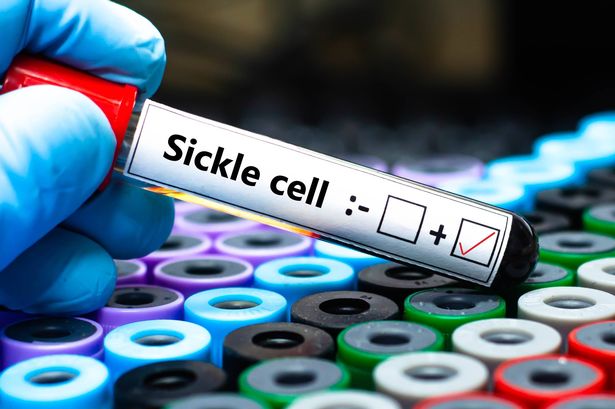Health
NHS Urges Testing for Sickle Cell Trait with Free Blood Test

The NHS has announced the importance of being aware of the sickle cell trait and is encouraging individuals to undergo testing through a simple and free blood test. This initiative is particularly vital as carriers of the sickle cell trait may not experience symptoms but can pass on the sickle cell disease to their children.
In a recent post on social media, the NHS explained, “Having the sickle cell trait means that you carry one of the genes that causes sickle cell disease, but you do not have the condition yourself. You can find out if you have the trait by contacting your GP and asking for a simple, free blood test.”
Sickle cell disease comprises a series of serious, lifelong health issues affecting red blood cells. It is most prevalent among individuals of African or Caribbean descent, and can lead to severe complications, including painful sickle cell crises, increased vulnerability to infections, and chronic anaemia that results in fatigue.
Individuals with the sickle cell trait do not suffer from the disease but carry one of the genes that can lead to it. While they are not at risk of developing sickle cell disease themselves, they may face challenges if they have children with partners who also carry the trait. In certain circumstances, such as undergoing surgery under general anaesthesia or engaging in strenuous physical activities, carriers may require additional precautions to ensure their health is not compromised due to inadequate oxygen levels.
The NHS further clarified, “Anyone can be a carrier of sickle cell, but it’s much more common in people from certain ethnic backgrounds. In the UK, most people who carry the sickle cell trait have an African or Caribbean family background.”
For those interested in determining whether they carry the sickle cell trait, a free blood test can be requested through their GP. Additionally, in England, all expectant mothers are offered screening to assess the risk of having a child with sickle cell disease.
In regions where sickle cell disease is more common, pregnant women are routinely offered a blood test to check for the trait. In areas with lower prevalence, a questionnaire about family origins is used to ascertain the need for testing. The NHS recommends that screening ideally occurs before the 10-week mark of pregnancy, allowing couples the opportunity to consider additional tests if needed.
The NHS’s emphasis on sickle cell trait testing coincides with an ongoing parliamentary petition advocating for sickle cell disease to be added to the list of conditions exempt from prescription charges. This change would potentially allow many patients to access necessary medications without cost. Currently, medication for sickle cell disease does not fall under this exemption, unlike treatments for diabetes, epilepsy, and cancer.
The petitioners argue that the current policy is unfair, as individuals with sickle cell disease may face financial burdens despite being unable to work due to their condition. In response, the Government has stated that “extensive arrangements” are already in place to ensure medications remain affordable in England and noted that there are “no current plans” to include sickle cell disease in the exemption list.
In an official statement issued on August 11, the Government remarked, “The Government has no current plans to review the list of medical conditions that entitle someone to apply for a medical exemption certificate, including relating to sickle cell disease. Approximately 89% of prescription items are dispensed free of charge in the community in England, and there are a wide range of exemptions from prescription charges already in place for which those with sickle cell disease may be eligible.”
As of now, the petition titled “Add Sickle Cell Disease to NHS Prescription Charge Exemption List” has garnered over 25,700 signatures. If it reaches 100,000 signatures, it will be considered for a parliamentary debate.
For more information on sickle cell testing and the ongoing petition, individuals can visit the NHS website.
-

 Health3 months ago
Health3 months agoNeurologist Warns Excessive Use of Supplements Can Harm Brain
-

 Health3 months ago
Health3 months agoFiona Phillips’ Husband Shares Heartfelt Update on Her Alzheimer’s Journey
-

 Science1 month ago
Science1 month agoBrian Cox Addresses Claims of Alien Probe in 3I/ATLAS Discovery
-

 Science1 month ago
Science1 month agoNASA Investigates Unusual Comet 3I/ATLAS; New Findings Emerge
-

 Science4 weeks ago
Science4 weeks agoScientists Examine 3I/ATLAS: Alien Artifact or Cosmic Oddity?
-

 Entertainment4 months ago
Entertainment4 months agoKerry Katona Discusses Future Baby Plans and Brian McFadden’s Wedding
-

 Science4 weeks ago
Science4 weeks agoNASA Investigates Speedy Object 3I/ATLAS, Sparking Speculation
-

 Entertainment4 months ago
Entertainment4 months agoEmmerdale Faces Tension as Dylan and April’s Lives Hang in the Balance
-

 World3 months ago
World3 months agoCole Palmer’s Cryptic Message to Kobbie Mainoo Following Loan Talks
-

 Science4 weeks ago
Science4 weeks agoNASA Scientists Explore Origins of 3I/ATLAS, a Fast-Moving Visitor
-

 Entertainment4 months ago
Entertainment4 months agoLove Island Star Toni Laite’s Mother Expresses Disappointment Over Coupling Decision
-

 Entertainment3 months ago
Entertainment3 months agoMajor Cast Changes at Coronation Street: Exits and Returns in 2025









